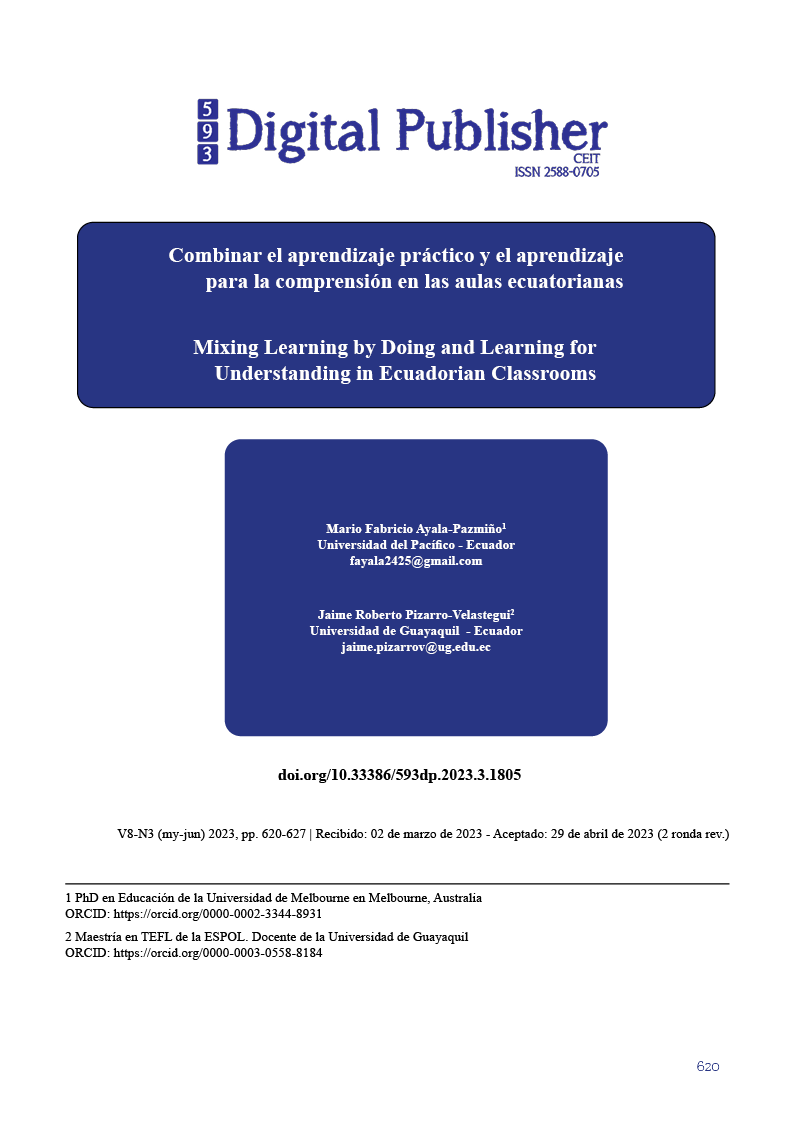Mixing Learning by Doing and Learning for Understanding in Ecuadorian Classrooms
Main Article Content
Abstract
This article examines the potential benefits of combining Learning by Doing and Learning for Understanding approaches in Ecuadorian classrooms. Learning by Doing emphasizes hands-on, experiential learning while Learning for Understanding focuses on deepening students' understanding of concepts through inquiry and reflection. By combining these approaches, students can gain practical skills and a deeper understanding of the subject matter. This article draws on existing research on Learning by Doing and Learning for Understanding to explore how these approaches can be integrated into Ecuadorian classrooms. The article describes a study that investigates implementing these approaches in an Ecuadorian high school, using a combination of pre and post-tests and interviews with students and teachers. The study results suggest that combining Learning by Doing and Learning for Understanding can improve student engagement and achievement and more positive teacher attitudes toward teaching. The article concludes by discussing the implications of these findings for implementing these approaches in Ecuadorian classrooms and highlighting areas for future research. Overall, this article argues that combining Learning by Doing and Learning for Understanding can offer a powerful educational approach that can benefit both students and teachers in Ecuadorian classrooms and highlights areas for future research.
Downloads
Article Details

This work is licensed under a Creative Commons Attribution-NonCommercial-ShareAlike 4.0 International License.
1. Derechos de autor
Las obras que se publican en 593 Digital Publisher CEIT están sujetas a los siguientes términos:
1.1. 593 Digital Publisher CEIT, conserva los derechos patrimoniales (copyright) de las obras publicadas, favorece y permite la reutilización de las mismas bajo la licencia Licencia Creative Commons 4.0 de Reconocimiento-NoComercial-CompartirIgual 4.0, por lo cual se pueden copiar, usar, difundir, transmitir y exponer públicamente, siempre que:
1.1.a. Se cite la autoría y fuente original de su publicación (revista, editorial, URL).
1.1.b. No se usen para fines comerciales u onerosos.
1.1.c. Se mencione la existencia y especificaciones de esta licencia de uso.
References
Allsopp, D. H., Kyger, M. M., & Lovin, L. A. (2016). The impact of project-based learning on student engagement: A study of high school students. Journal of Research in Innovative Teaching & Learning, 9(1), 4-33.
Boss, S. (2011). Project-based learning: What experts say. Edutopia. Retrieved from https://www.edutopia.org/project-based-learning-experts
Delgado-Segura, R., & Hidalgo-Aroca, R. (2019). Project-Based Learning as an Approach to Improve Student Engagement and Achievement: A Case Study in Ecuadorian High School. Education Sciences, 9(4), 309. https://doi.org/10.3390/educsci9040309
Hmelo-Silver, C. E., Duncan, R. G., & Chinn, C. A. (2007). Scaffolding and achievement in problem-based and inquiry learning: A response to Kirschner, Sweller, and Clark (2006). Educational Psychologist, 42(2), 99-107.
Hong, J. C., Lee, H. J., & Lim, D. H. (2016). Effects of blended learning on student engagement and achievement in a Korean middle school context. Computers & Education, 101, 217-230. doi: 10.1016/j.compedu.2016.07.003.
Jonassen, D. H. (1991). Objectivism versus constructivism: Do we need a new philosophical paradigm? Educational Technology Research and Development, 39(3), 5-14.
Kafai, Y. B., & Resnick, M. (1996). Constructionism in practice: Designing, thinking, and learning in a digital world. Routledge.
Krajcik, J. S., Blumenfeld, P. C., Marx, R. W., & Soloway, E. (1994). A collaborative model for helping middle-grade science teachers learn project-based instruction. The Elementary School Journal, 94(5), 483-497.
Pekrun, R., Elliot, A. J., & Maier, M. A. (2009). Achievement goals and achievement emotions. In S. Karabenick & R. L. Newman (Eds.), Educational Psychology: Conceptualizing and Measuring Competence in Context (pp. 165-183). Routledge.
Zhu, Y., Hu, Z., & Huang, X. (2019). Combining project-based learning and inquiry-based learning to promote students' creativity, critical thinking, and problem-solving skills. International Journal of Emerging Technologies in Learning (iJET), 14(08), 4-15. doi: 10.3991/ijet.v14i08.10763.



